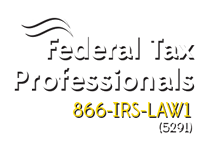How To Eliminate IRS Penalties
Call Now – Free Consultation 866-477-5291
Are you in tax debt? Get tax help by requesting an abatement or reduction of IRS penalties. Of course, you’ll need to prepare a Form 843, also known as a Claim for Refund and Request for Abatement. Then you must submit it to the IRS. The form requires that you indicate, among other things, the type of penalty that you’re asking to be abated by identifying the actual law for which it applies.
- Internal Revenue Code section 6651(a)(1) Failure to File Tax Return
- Internal Revenue Code section 6651(a)(2) Failure to Pay Tax when Due
The Form 843 also requires that you explain the reasons that you’re asking for the penalties to be abated. Those reasons include, but aren’t limited to the following examples:
- Written or oral advice from the IRS
- Advice from a tax adviser
- Correction of an IRS error
- Fire, casualty, natural disaster or other disturbance
Some penalties can also be abated if you have a reasonable cause for not complying and can show that you exercised ordinary business care and prudence. To get an abatement of penalties due to reasonable cause, you must have a reason that indicates you had no control over the situation. For instance, you were unable to file your tax return timely because you were seriously ill.
We strongly recommend that you don’t attempt to request penalty abatement yourself. The IRS’s penalty abatement review procedures are very strict. One wrong word or statement can be cause for automatic denial of your request.
The IRS threatens imposing heavy penalties as a deterrent for taxpayers who file tax returns late and make late payments. The IRS wants taxpayers to fear these huge penalties, much like the people who are financing a car fear swift repossession if they don’t make timely payments.
Although you have a right to request abatement of penalties, it’s important to know that the IRS doesn’t easily agree to reduce or eliminate penalties against you.
Beware of inexperienced or unprofessional firms that promise you they will get your penalty abatement approved. No one can guarantee that the IRS will approve your request to abate penalties. Approval or denial is solely in the hands of the IRS, and their decision can take months.
If the IRS denies your request to abate penalties, you should know that you have a right to request that the IRS’s Appeals Division perform an administrative review of the decision. The process requires a separate request and meetings with an IRS Appeals employee. Thanks to Federal Tax Professionals’ experience, including our work in the IRS’s Appeals Division, we can defend you if they reject your request for penalty abatement.
Hiring Federal Tax Professionals to prepare your request to abate penalties will give you a distinct advantage over doing it yourself or having a less qualified firm helping you. We know the tax laws and use your personal circumstances to put together the best penalty abatement request possible. There are strict guidelines that must be followed when dealing with the IRS and filing penalty abatements. Filing an abatement request too early or too late in the resolution process can result in its rejection. Federal Tax Professionals can successfully navigate though the “mine field” known as the penalty abatement claim procedure.
Whatever you do, it’s in your best interest to contact Federal Tax Professionals to discuss your unique situation. Your circumstances may fall into a category not shown above. Regardless, we will still help you. Penalties can accrue and get larger each day. The sooner you call us, the faster we can help you by taking the necessary steps to get these penalties eliminated. You can be back on your feet in no time.

